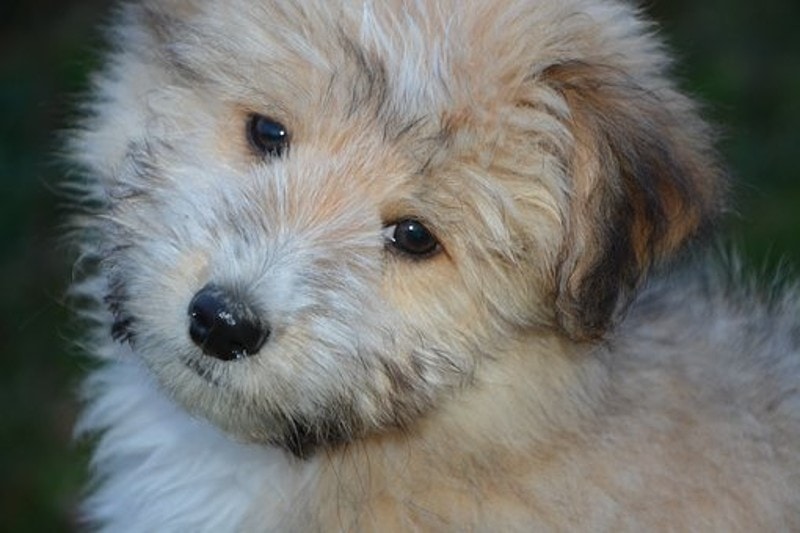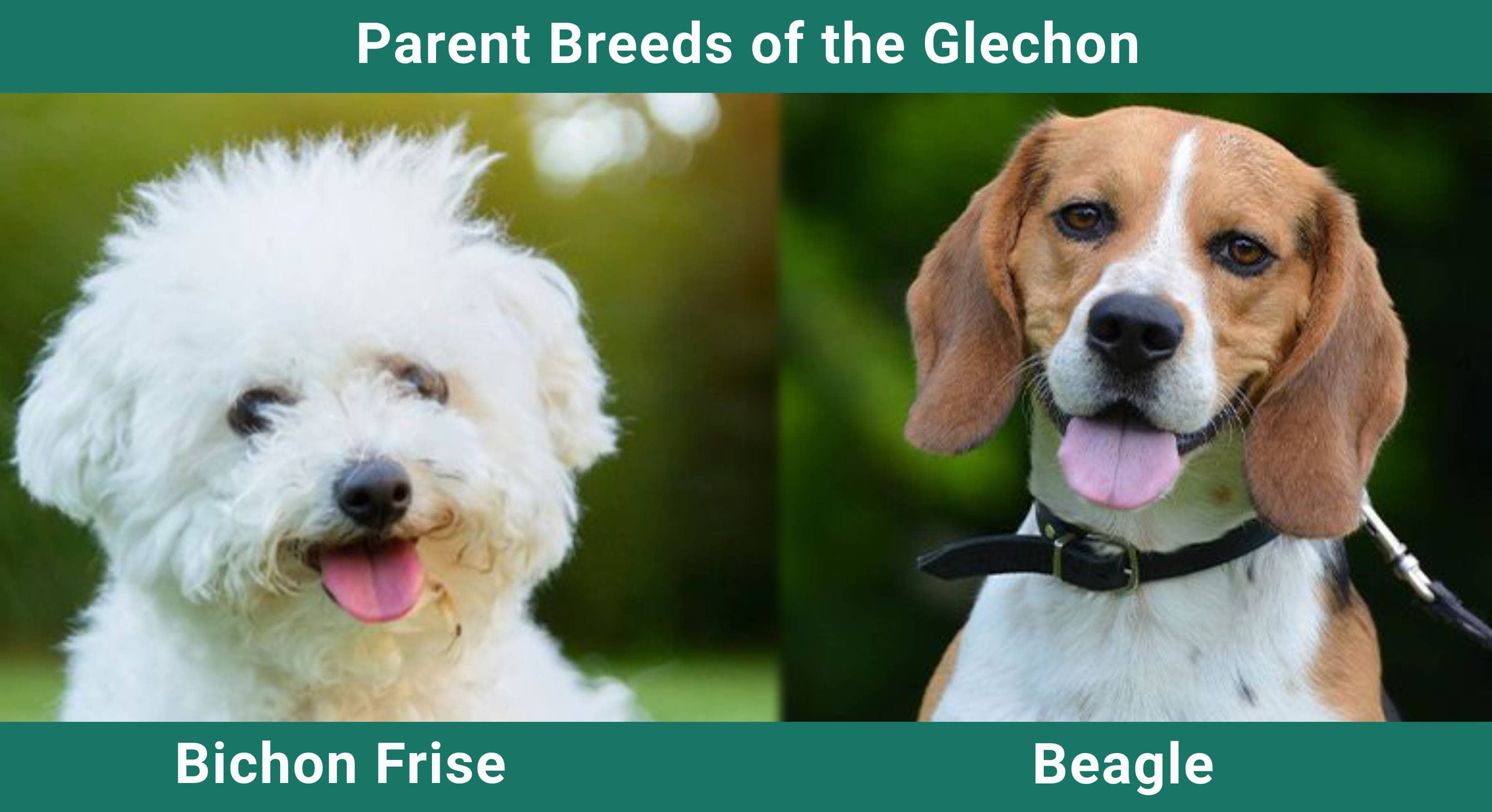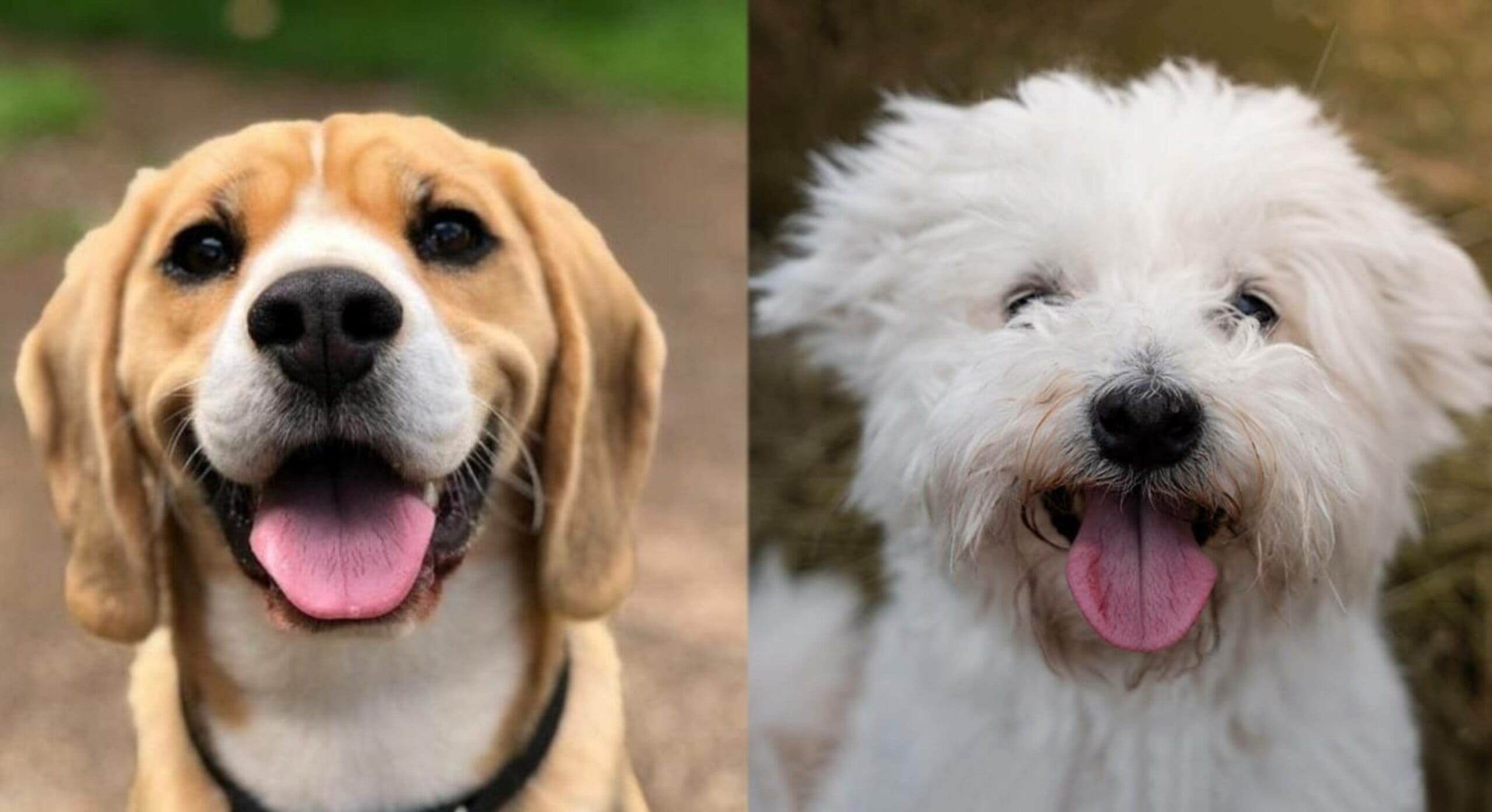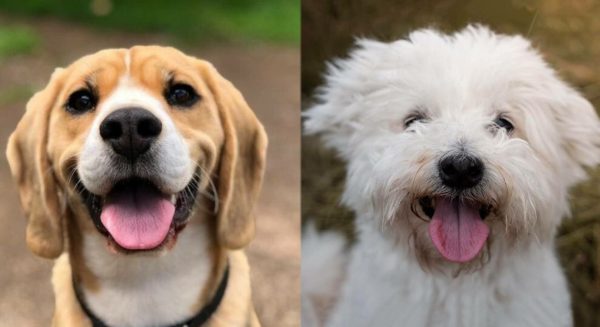Click Below to Skip Ahead
A mix between a Beagle and Bichon Frise, the Glechon is a bit of a mixed bag no matter where you look. You might be able to train them, or they might be among the most stubborn dogs on the planet. Perhaps they’ll play fetch, or they might just go after any scent that strikes their nose. The unexpectedness of each trait makes each pup unique and adds to their charming appeal. They also get along great with other dogs and tend to be low shedding, both of which are huge perks.
Breed Overview
Height:
13-20 inches
Weight:
15-35 pounds
Lifespan:
12-15 years
Colors:
White, blue, silver, red, brown, gray, and black
Suitable for:
Multiple pet homes, apartment living, and those looking for a low-shedding dog
Temperament:
Brave, intelligent, loving, and loyal
But what else drives owners toward these adorable dogs, and is one right for your home? We break down everything that you need to know about the Glechon here in our ultimate care guide.

Glechon Puppies

Keep in mind that some Glechon puppies are second or third-generation, and this can impact your dog’s personality and how much they take after each parent breed. The parent breeds are generally healthy dogs, with loving and energetic personalities. Their coat colors will also depend on their parents, and there is a wide variety of beautiful Glechon colors.
Before you welcome a Glechon into your home, consider the time and energy they need to offer them enough exercise and playtime. Glechons are extremely loving, and they are a good option for families.

Temperament & Intelligence of the Glechon
With both the Beagle and the Bichon Frise being intelligent dogs, there’s little doubt that your Glechon will be smart too. They’ll also be extremely loyal, loving, and brave.
While you might not have a guard dog in size, you’ll almost certainly have one in spirit. They love attention and want to please their owners. However, if they take after their Beagle parentage, you might notice that they have a one-track mind that can make certain activities all but impossible.
Glechons are extremely friendly and gentle dogs that love to cuddle and spend time with their owners, but they don’t suffer from separation anxiety as much as some other breeds.
Are These Dogs Good for Families?
There are few dog breeds out there better suited for families than the Glechon. They are extremely patient by nature, and their medium-sized build means they are great around smaller children.
They are large and patient enough that the occasional fall by a child learning to walk won’t hurt them, for example, but they aren’t too large to where they’ll accidentally knock down toddlers or smaller children.
Additionally, while they bond to a family, they don’t overly bond to one person like many other breeds, which means everyone in the family can spend time with them.
These characteristics make them the perfect fit for people just looking to start their family or those with older children.
Does This Breed Get Along With Other Pets?
While the Glechon gets along great with other pets, early socialization is vital. Getting your Glechon around other animals early and often is the best way to ensure that they’ll do well later in life with other pets.
If you’re thinking of bringing a Glechon puppy into a home with other animals, there shouldn’t be any problems, but if you have an older Glechon and are thinking of bringing in other pets, there might be a few hiccups.
Whether you want to bring in a puppy or another animal, you should always set up a trial run or a meet and greet to ensure that everyone will get along before adopting them.
Things to Know When Owning a Glechon
Before adopting a Glechon, there are a few things that you need to know to keep everything going smoothly. Whether it’s basic care requirements, so you know how much they’ll cost you every month, or overall exercise requirements, we broke it all down for you here.
Food & Diet Requirements
The Glechon is a bit prone to obesity problems, and the best way that you can prevent this from happening is by keeping them on a healthy diet of high-quality kibble.
While the exact amount of kibble that your Glechon will eat varies depending on their size, expect to feed them anywhere from 1.25 and 2 cups of food each day. You can give them the occasional treat, but stay away from table scraps, which can quickly lead to obesity and other health problems.
Also, never go with low-quality food that’s full of fillers, as this can lead to more expensive health problems and even shorten your dog’s overall lifespan.
Exercise
While their smaller size might make a Glechon a great choice for those who live in an apartment, that doesn’t mean they don’t need to get out for exercise. These pups should average about 9 miles of walking per week, and you need to take them out every day.
While they aren’t the most energetic breed on the planet, they are active, and if you’re not meeting their daily exercise requirements, they can start to get destructive and exhibit other unwanted boredom behavior activities.
But while they need daily walks, don’t set the pace too fast. They’re still a smaller dog breed and don’t do well with jogs, runs, or other strenuous activities over longer distances.
Training
While both the Bichon Frise and the Beagle are extremely intelligent breeds, how easy they are to train will vary drastically depending on which parent breed they take after. The Bichon Frise in them is extremely easy to train, while the Beagle has a short attention span that can make training difficult.
The best thing that you can do is stay consistent and use plenty of rewards, like treats, to keep their attention. Just be sure to use a low-fat treat, so your training sessions don’t lead to unwanted weight gain.
Grooming ✂️
Like many designer breeds, the Glechon can have an extremely different coat depending on what parent breed they take after. Your Glechon might have a short coat that requires minimal maintenance, or they might have a long coat that requires daily brushing.
No matter which coat your Glechon inherits, they’ll still need baths to keep skin conditions in check, and you need to brush their teeth a few times a week for good oral hygiene.
Health and Conditions
While the Glechon tends to be healthier than most purebred breeds, that doesn’t mean there aren’t a few concerns that you need to keep an eye out for. The best thing that you can do to keep your Glechon healthy is to feed them a high-quality diet and meet all their daily exercise requirements.
Still, some problems are genetic, and if you start to notice any symptoms, you need to take them to a vet as soon as possible. Even some of the minor conditions highlighted here can become serious if left untreated.
- Eye problems
- Obesity
- Allergies
- Ear infections
- Bladder problems
- Patellar luxation
- Intervertebral disk disease
- Epilepsy
- Beagle dwarfism
Male vs Female
While there aren’t many differences between a male or a female Glechon, there are a few dog-specific differences that you should be aware of before adopting.
First, males tend to need more attention from their owners than females. While dogs in general tend to need plenty of attention and love, males crave and need it more.
Second, males tend to be a bit larger. While this has much to do with which breed they take after, a male still tends to be a few inches taller than a female.
Finally, housebreaking a male tends to be easier after neutering, but for a female, it tends to be more difficult overall. So, if you plan on neutering your Glechon, you’ll have an easier time housebreaking them than with a female.
3 Little-Known Facts About the Glechon
1. Glechons can be both hypoallergenic and non-hypoallergenic
Bichon Frises are among the most hypoallergenic dogs out there, and many people assume that this means their Glechon will be hypoallergenic too. However, it all depends on what parent breed they take after. The Beagle is not hypoallergenic, and if your Glechon after them, then you’ll have plenty of dander about.
However, both the Beagle and the Bichon Frise are low shedding, so you shouldn’t have to deal with a ton of pet hair either way.
2. Most Glechons are extremely vocal
While there are many different personality traits between the Bichon Frise and the Beagle, their tendency to make noise isn’t one of them. Both the Bichon Frise and the Beagle will bark or howl, so expect your Glechon to make some noise unless you train them otherwise.
3. They are great family dogs despite their smaller size
The Glechon isn’t the largest dog around, but they do great around both small and large children. They tend to have an extremely forgiving nature, so accidental slips and falls shouldn’t be a problem.
But it’s still crucial that you teach your children how to behave around these pups, as their patience will only stretch so far.
Final Thoughts
While determining exactly what you’re getting yourself into can be a bit of a challenge with a Glechon, the traits that you’re getting for sure make them worth it. They’re extremely loving and kind, and they make great family dogs.
So, whether you’re looking to add another puppy to your home or become a first-time pet owner, the Glechon makes a great choice! Just be sure you have the time and energy to commit to them before adopting, because the last thing that anyone wants is to rehome a dog after they’ve already bonded with you.
Featured Image Credit: Left – Gabriel JH, Shutterstock | Right – Benoît Deschasaux, Unsplash








